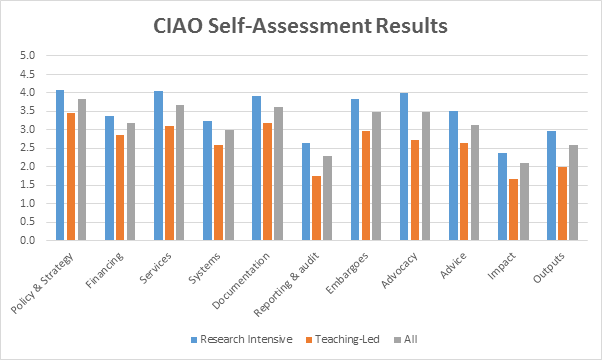Original post by on this JISC website.
Background
Over the past month, Research Consulting has been undertaking a review of UK higher education institutions’ progress towards implementation of the open access policy for a post-2014 Research Excellence Framework (REF). Based on the six institutional workshops, completed with the support of the Jisc Open Access Good Practice Pathfinder projects, as well as interviews with Jisc and HEFCE staff, the study has identified how much progress has been made across the sector to implement the policy and distinguished where there may be further opportunities to support institutions in this area.
Summary Findings
The Collaborative Institutional Assessment of Open access (CIAO) tool was used to gauge institutions’ current level of readiness of the REF policy. Based on responses from 37 participating institutions, summarised below, the study found that, whilst all institutions were actively pursuing implementation of the REF open access policy, research-intensive institutions were generally found to have more developed open access capabilities than teaching-led institutions.
Across all institution-types, however, the following key challenges were given high priority as potentially critically affecting the institution’s ability to comply with the policy:
• Difficulties in identifying accepted articles
• Difficulties in monitoring and benchmarking compliance
• Difficulties in tracking deposits in subject repositories
• Uncertainty over audit requirements, particularly in relation to exceptions
• Systems deficiencies which may result in significant compliance issues.
Other significant issues of note
• A tendency towards ‘gold-plating’ of processes and uncertainty over audit requirements which could be alleviated through reliance on institutional internal audit functions.
• The added value of self-archiving where articles are made OA through the gold route appears limited relative to the effort involved.
• The SHERPA/REF tool, in development, could save time and promote greater author engagement with the policy, if the results delivered were formally endorsed by HEFCE.
Resourcing also presented a further challenge for institutions, due to a rapid rise in deposits and potential inefficiencies in current processes. A large number of less significant issues were also raised, including difficulties in securing and identifying the AAM, uncertainties over dates of acceptance and publication, and concerns over staff recruitment and retention.
This PDF provides a full breakdown of the implementation challenges
Projects services directly/ indirectly supporting REF compliance
There are a range of existing Jisc projects and services with the potential to address some of the issues identified. The most important are considered to be the SHERPA services, Publications Router and the RIOXX/CASRAI projects, but institutions also see scope for ORCID, IRUS-UK, Jisc Collections and CORE to support REF compliance.
Recommendations
The recommendations to Jisc arising from this work are as follows:
1. Jisc should review its arrangements for supporting institutional repositories, in view of the concerns identified over usability, required levels of technical support and uncertainty over how some specialist institutions can achieve compliance with the REF OA policy.
2. A comprehensive picture of the current research information system (CRIS) and repository solutions in use by UK HEIs, and the interactions between them, should be developed in order to effectively inform planning of Jisc projects and services.
3. Jisc should actively develop relationships with the major CRIS vendors, to ensure the sector’s requirements in respect of the REF OA policy are clearly understood and reflected in supplier roadmaps.
4. A working group should be convened to explore the role of subject repositories, and consider what opportunities exist to enable REF-compliant deposit in these repositories, with metadata subsequently shared with institutions.
5. Jisc should explore opportunities to collect and share relevant data on compliance with the REF OA policy, for example through further development of the CORE service.
6. The OA Pathfinder programme should take these recommendations into account, and seek to develop and disseminate good practice in the management of exceptions, among other areas.
Next steps
Jisc is committed to supporting the sector in their implementation of the policy and to focus its efforts and resource on those areas recommended by this study. Over the coming weeks, therefore, Jisc will be considering how its projects/ services can potentially be refocused/ reallocated to address the most urgent issues faced by institutions and will release details of these plans as soon as they become available.












 Expand Your Impact: Collaboration and Networking Workshops for Researchers
Expand Your Impact: Collaboration and Networking Workshops for Researchers Visiting Prof. Sujan Marahatta presenting at BU
Visiting Prof. Sujan Marahatta presenting at BU 3C Event: Research Culture, Community & Can you Guess Who? Thursday 26 March 1-2pm
3C Event: Research Culture, Community & Can you Guess Who? Thursday 26 March 1-2pm UKCGE Recognised Research Supervision Programme: Deadline Approaching
UKCGE Recognised Research Supervision Programme: Deadline Approaching ECR Funding Open Call: Research Culture & Community Grant – Apply now
ECR Funding Open Call: Research Culture & Community Grant – Apply now ECR Funding Open Call: Research Culture & Community Grant – Application Deadline Friday 12 December
ECR Funding Open Call: Research Culture & Community Grant – Application Deadline Friday 12 December MSCA Postdoctoral Fellowships 2025 Call
MSCA Postdoctoral Fellowships 2025 Call ERC Advanced Grant 2025 Webinar
ERC Advanced Grant 2025 Webinar Update on UKRO services
Update on UKRO services European research project exploring use of ‘virtual twins’ to better manage metabolic associated fatty liver disease
European research project exploring use of ‘virtual twins’ to better manage metabolic associated fatty liver disease